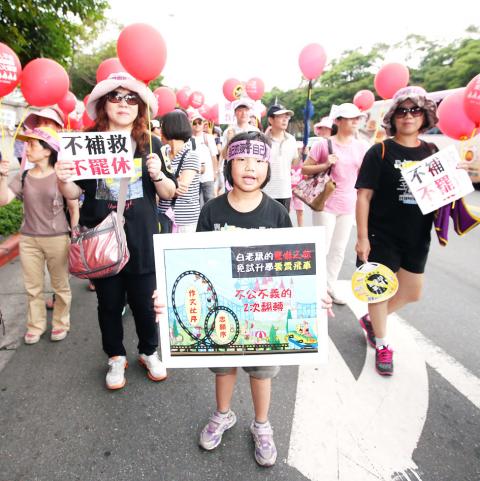Demonstrators took to the streets of Taipei yesterday against a new mechanism in senior-high school admittance, which they say is unfair because it does not take into account students’ grades.
The mechanism is part of the new 12-year national education system and deducts points from students each time they fail to be accepted by a school on their list, which effectively punishes children for aiming too high.
Hundreds of parents and teachers took part in the parade, organized by the Alliance on Obligatory Education.

Photo: CNA
They gathered on Ketagalan Boulevard, saying the mechanism is unfair because some students in the first phase failed to land a school, even though they obtained high grades in examinations.
“We have to save our own children, save our own future and our nation on our own,” they said.
“We want adaptive education and real democracy,” they chanted. “We want the point deduction mechanism abolished.”
The alliance said that the Chinese Nationalist Party (KMT) legislators, having a majority of seats in the legislature, passed the Senior-High School Education Act (高級中等教育法) in June last year, and directly enforced the new 12-year national education system, without testing the system in advance.
This new senior-high school admittance process is like gambling, protesters said, adding that it deprives the parents of their right to choose the best education for their children.
“Why can the system not be made transparent so that students can choose the school they want according to their results?” one protester said.
“While the first phase of the admittance results have been announced, we want remedial measures in place for the second phase,” a parent said, while another parent shouted: “Minister of Education Chiang Wei-ling (蔣偉寧) step down from your post.”
A teacher surnamed Chang (張) said she was dissatisfied with the point deduction mechanism, which left six of her 10 highest-graded students without a school.
A parent surnamed Wang (王) said: “My son was shocked when he saw he was unable to land any schools, even though he scored 5 A’s and filled in 30 preferred schools.”
Another parent surnamed Lin (林) said there was no guidance for families to refer to when they filled in the school preference section, so it felt like gambling on their children’s future.
The protesters ended their demonstration at the Legislative Yuan, where they split into discussion groups for, what they called, “deliberative democracy on the streets” over two topics: whether point deduction should be enforced and how the entrance mechanisms should be redesigned.
The demonstrators also asked for grade intervals to be made smaller, as well as for the officials responsible for the flawed system to be punished.

Right-wing political scientist Laura Fernandez on Sunday won Costa Rica’s presidential election by a landslide, after promising to crack down on rising violence linked to the cocaine trade. Fernandez’s nearest rival, economist Alvaro Ramos, conceded defeat as results showed the ruling party far exceeding the threshold of 40 percent needed to avoid a runoff. With 94 percent of polling stations counted, the political heir of outgoing Costa Rican President Rodrigo Chaves had captured 48.3 percent of the vote compared with Ramos’ 33.4 percent, the Supreme Electoral Tribunal said. As soon as the first results were announced, members of Fernandez’s Sovereign People’s Party

EMERGING FIELDS: The Chinese president said that the two countries would explore cooperation in green technology, the digital economy and artificial intelligence Chinese President Xi Jinping (習近平) yesterday called for an “equal and orderly multipolar world” in the face of “unilateral bullying,” in an apparent jab at the US. Xi was speaking during talks in Beijing with Uruguayan President Yamandu Orsi, the first South American leader to visit China since US special forces captured then-Venezuelan president Nicolas Maduro last month — an operation that Beijing condemned as a violation of sovereignty. Orsi follows a slew of leaders to have visited China seeking to boost ties with the world’s second-largest economy to hedge against US President Donald Trump’s increasingly unpredictable administration. “The international situation is fraught

MORE RESPONSIBILITY: Draftees would be expected to fight alongside professional soldiers, likely requiring the transformation of some training brigades into combat units The armed forces are to start incorporating new conscripts into combined arms brigades this year to enhance combat readiness, the Executive Yuan’s latest policy report said. The new policy would affect Taiwanese men entering the military for their compulsory service, which was extended to one year under reforms by then-president Tsai Ing-wen (蔡英文) in 2022. The conscripts would be trained to operate machine guns, uncrewed aerial vehicles, anti-tank guided missile launchers and Stinger air defense systems, the report said, adding that the basic training would be lengthened to eight weeks. After basic training, conscripts would be sorted into infantry battalions that would take

GROWING AMBITIONS: The scale and tempo of the operations show that the Strait has become the core theater for China to expand its security interests, the report said Chinese military aircraft incursions around Taiwan have surged nearly 15-fold over the past five years, according to a report released yesterday by the Democratic Progressive Party’s (DPP) Department of China Affairs. Sorties in the Taiwan Strait were previously irregular, totaling 380 in 2020, but have since evolved into routine operations, the report showed. “This demonstrates that the Taiwan Strait has become both the starting point and testing ground for Beijing’s expansionist ambitions,” it said. Driven by military expansionism, China is systematically pursuing actions aimed at altering the regional “status quo,” the department said, adding that Taiwan represents the most critical link in China’s